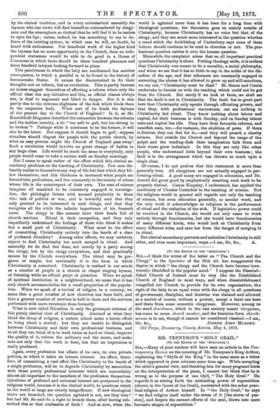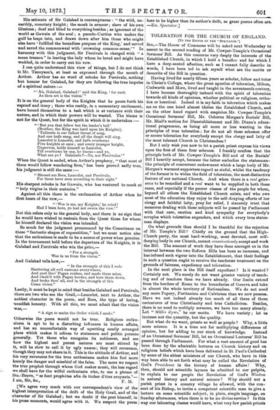MR. 'TENNYSON'S "HOLY GRAIL."
[TO THE Forroa OF THE "SPECTATOR."] SIR,—Many of your readers will have seen an article in the Con- temporary Review on the meaning of Mr. Tennyson's King Arthur, explaining the "Idylls of the King" in the same sense as a letter which appeared in your columns some time ago. While accepting the critic's general view, and thanking him for many pregnant hints on the interpretation of the poem, I cannot but think that he is wrong as to the purpose of one idyll, "The Holy Grail." He regards it as setting forth the misleading power of superstition (shown in the Quest of the Grail), contrasted with the sober prac- tical religion of Arthur himself. In "the Holy Grail," he says "we find religion itself under the stress of it [the storm of pas- sion], and despite the earnest efforts of the soul, blown into mere fantastic shapes of superstition." His estimate of Sir Galahad is contemptuous : "the wild, un- earthly, cometary knight ; the monk in armour ; slave of his own illusions ; deaf and blind to everything besides ; as ignorant of the world as Gawain of the soul ; a pseudo-Curtius who makes the gulf he leaps into, and draws down after him those who might else have fulfilled the boundless purpose of the King,' and served and saved the commonweal with ' crowning common-sense.'" In harmony with this judgment, Sir Percivale is charged with "a
mean treason" in leaving the lady whom he loved and might have wedded, in order to carry out his vow.
I can quite understand this view of things, but I do not think it Mr. Tennyson's, at least as expressed through the mouth of Arthur. Arthur has no word of rebuke for Percivale, nothing but honour for Galahad, for they are following the true impulse of a spiritual nature :—
",.A.h, Galahad, Galahad !' said the King, 'for such As thou art is the vision."
It is on the general body of the Knights that he pours forth his 'reproof and irony ; those who rashly, in a momentary excitement, have bound themselves to a task which is at variance with their mature, and in which their powers will be wasted. The blame is not for the Quest, but for the spirit in which it is undertaken :—
"'But you that follow but the leader's bell' (Brother, the King was hard upon his Knights), Taliessin is our fullest throat of song,
And one hath sung, and all the dumb will sing. Lancelot is Lancelot, and hath overborne Five knights at once ; and every younger knight, Unproven, holds himself as Lancelot, Till overborne by one, he learns—and ye, What are ye ? Galahads P—No, nor Percivales."
When the Quest is ended, when Arthur's prophecy, "that most of them would follow wandering fires," has been proved sadly true, kis judgment is still the same :—
"Blessed are Bors, Lancelot, and Percivale,
For these have seen according to their sight."
His sharpest rebuke is for Gawain, who has ventured to mock at -" holy virgins in their ecatacies."
Against all this there is the exclamation of Arthur when he &rat hears of the vow,— " 'Woe is me, my Knights,' he cried
Had I been here, ye had not sworn the vow."
But this refers only to the general body, and there is no sign that he would have wished to restrain from the Quest those for whom be himself declared the vision was intended.
So much for the judgment pronounced by the Conscience on these "fantastic shapes of superstition," but we must notice also that the enthusiasm is made to be a source of power when genuine. In the tournament held before the departure of the Knights, it is Galahad and Percivale who win the prize,—
" For a strength
Was in us from the vision."
And Galahad tells how,—
" In the strength of this I rode Shattering all evil customs everywhere, And past thro' Pagan realms, and made them mine, And clash'd with Pagan hordes, and bore them down, And broke thro' all, and in the strength of this Come victor."
-Lastly, it must be kept in mind that besides Galahad and Percivale, there are two who see the Grail,—Lancelot, next to Arthur, the noblest character in the poem, and Bore, the type of loving, -unselfish honesty. With all this, we must admit that the vision
-was,— " A sign to maim the Order which I made."
Otherwise the poem would not be true. Religious enthu- eiasm is apt to be a disturbing influence in human affairs, and has an uncomfortable way of upsetting neatly arranged plans which makes it odious to statesmen and politic persons generally. Yet those who recognise its nobleneSs, and see
tow the highest and purest natures are most stirred by it, will be slow to call it by ugly names ; they will reverence, -though they may not share in it. This is the attitude of Arthur, and -his very reverence for the true enthusiasm makes him feel more keenly the danger and mischief of the false. The more we respect the true prophet through whom God makes music, the less regard we shall have for the wilful enthusiasts who, to use a phrase of
Ste.-Beuve, "Se font prophetes afin de tacher d'être croyants."— [We agree very much with our correspondent's view of the highest interpretation of the drift of the Holy Grail, and of the character of Sir Galahad ; but we doubt if the poet himself, in Ins prose moments, would agree with it. We suspect the poem
here to be higher than its author's drift, as great poems often are. —ED. Spectator.]



































 Previous page
Previous page